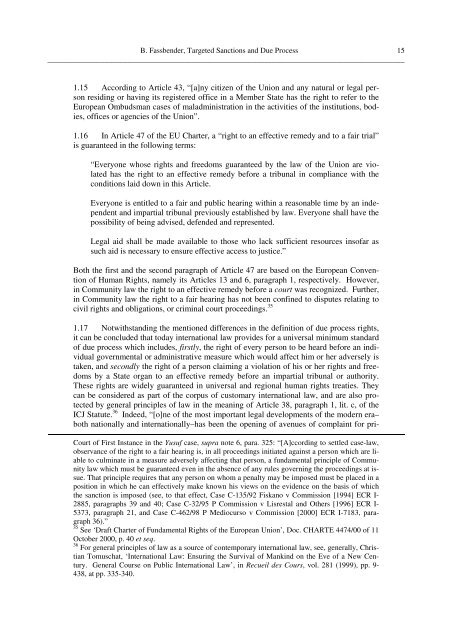Targeted Sanctions and Due Process - United Nations Treaty ...
Targeted Sanctions and Due Process - United Nations Treaty ...
Targeted Sanctions and Due Process - United Nations Treaty ...
Create successful ePaper yourself
Turn your PDF publications into a flip-book with our unique Google optimized e-Paper software.
B. Fassbender, <strong>Targeted</strong> <strong>Sanctions</strong> <strong>and</strong> <strong>Due</strong> <strong>Process</strong><br />
15<br />
______________________________________________________________________________________________<br />
1.15 According to Article 43, “[a]ny citizen of the Union <strong>and</strong> any natural or legal person<br />
residing or having its registered office in a Member State has the right to refer to the<br />
European Ombudsman cases of maladministration in the activities of the institutions, bodies,<br />
offices or agencies of the Union”.<br />
1.16 In Article 47 of the EU Charter, a “right to an effective remedy <strong>and</strong> to a fair trial”<br />
is guaranteed in the following terms:<br />
“Everyone whose rights <strong>and</strong> freedoms guaranteed by the law of the Union are violated<br />
has the right to an effective remedy before a tribunal in compliance with the<br />
conditions laid down in this Article.<br />
Everyone is entitled to a fair <strong>and</strong> public hearing within a reasonable time by an independent<br />
<strong>and</strong> impartial tribunal previously established by law. Everyone shall have the<br />
possibility of being advised, defended <strong>and</strong> represented.<br />
Legal aid shall be made available to those who lack sufficient resources insofar as<br />
such aid is necessary to ensure effective access to justice.”<br />
Both the first <strong>and</strong> the second paragraph of Article 47 are based on the European Convention<br />
of Human Rights, namely its Articles 13 <strong>and</strong> 6, paragraph 1, respectively. However,<br />
in Community law the right to an effective remedy before a court was recognized. Further,<br />
in Community law the right to a fair hearing has not been confined to disputes relating to<br />
civil rights <strong>and</strong> obligations, or criminal court proceedings. 35<br />
1.17 Notwithst<strong>and</strong>ing the mentioned differences in the definition of due process rights,<br />
it can be concluded that today international law provides for a universal minimum st<strong>and</strong>ard<br />
of due process which includes, firstly, the right of every person to be heard before an individual<br />
governmental or administrative measure which would affect him or her adversely is<br />
taken, <strong>and</strong> secondly the right of a person claiming a violation of his or her rights <strong>and</strong> freedoms<br />
by a State organ to an effective remedy before an impartial tribunal or authority.<br />
These rights are widely guaranteed in universal <strong>and</strong> regional human rights treaties. They<br />
can be considered as part of the corpus of customary international law, <strong>and</strong> are also protected<br />
by general principles of law in the meaning of Article 38, paragraph 1, lit. c, of the<br />
ICJ Statute. 36 Indeed, “[o]ne of the most important legal developments of the modern era–<br />
both nationally <strong>and</strong> internationally–has been the opening of avenues of complaint for pri-<br />
Court of First Instance in the Yusuf case, supra note 6, para. 325: “[A]ccording to settled case-law,<br />
observance of the right to a fair hearing is, in all proceedings initiated against a person which are liable<br />
to culminate in a measure adversely affecting that person, a fundamental principle of Community<br />
law which must be guaranteed even in the absence of any rules governing the proceedings at issue.<br />
That principle requires that any person on whom a penalty may be imposed must be placed in a<br />
position in which he can effectively make known his views on the evidence on the basis of which<br />
the sanction is imposed (see, to that effect, Case C-135/92 Fiskano v Commission [1994] ECR I-<br />
2885, paragraphs 39 <strong>and</strong> 40; Case C-32/95 P Commission v Lisrestal <strong>and</strong> Others [1996] ECR I-<br />
5373, paragraph 21, <strong>and</strong> Case C-462/98 P Mediocurso v Commission [2000] ECR I-7183, paragraph<br />
36).”<br />
35 See ‘Draft Charter of Fundamental Rights of the European Union’, Doc. CHARTE 4474/00 of 11<br />
October 2000, p. 40 et seq.<br />
36 For general principles of law as a source of contemporary international law, see, generally, Christian<br />
Tomuschat, ‘International Law: Ensuring the Survival of Mankind on the Eve of a New Century.<br />
General Course on Public International Law’, in Recueil des Cours, vol. 281 (1999), pp. 9-<br />
438, at pp. 335-340.
















